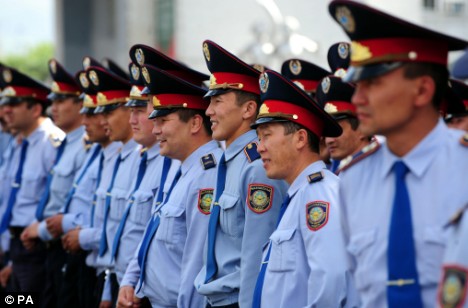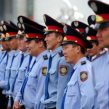
Astana Seeks to Expand Law Enforcement Cooperation with the US
Publication: Eurasia Daily Monitor Volume: 10 Issue: 225
By:

Kazakhstan is seeking to expand legal cooperation in criminal cases with the United States and potentially sign a Mutual Legal Assistance Treaty (MLAT) with Washington. During his visit to Washington on December 6, Kazakhstani Prosecutor-General Askhat Daulbayev discussed with US Attorney General Eric Holder expanding and strengthening the joint legal framework and legal assistance in criminal matters. Noting the successful cooperation of his office with US law enforcement agencies in criminal investigations, Daulbayev expressed gratitude for the assistance provided to Kazakhstan by the Federal Bureau of Investigation (FBI) and the Drug Enforcement Administration (DEA). The US and Kazakhstan are interested in collaboration and professional exchanges to fight international organized crime, terrorism, cyber crime, narcotics trafficking and money laundering. Concluding the meeting, the two chief prosecutors agreed to draft an inter-agency memorandum of understanding and cooperation. Although short of a bilateral treaty, this memorandum will expand relations between the law enforcement agencies of the two countries (Interfax-Kazakhstan, Zakon.kz, December 7; Office of the Prosecutor General, December 6).
On December 4, Askhat Daulbayev met with FBI Director James Comey to discuss bilateral legal cooperation in fighting international organized crime and terrorism. The two officials noted that a consolidation of efforts is becoming necessary to deal with contemporary challenges and threats and ensure international and regional security. Both sides expressed readiness to further develop mutually beneficial cooperation (BNews.kz, Zakon.kz, Interfax-Kazakhstan, December 4).
Kazakhstan’s Prosecutor-General was particularly interested in US experience with the training and re-training of law enforcement personnel, conducting criminal investigations, and using the polygraph. He visited the FBI Academy in Quantico, Virginia, to learn about specialized law enforcement training. The District of Columbia police department also shared its know-how in counter-terrorism and fighting street crime. The Kazakhstani prosecutor-general met with DEA head Michele Leonhart to exchange information on fighting drug trafficking. The two sides said that they were ready to expand cooperation and unite efforts to counter international organized crime (Interfax-Kazakhstan, December 4).
Daulbayev’s visit to Washington came at a time when the US is preparing to withdraw from Afghanistan by the end of 2014, prompting regional concerns that Washington will be less engaged in Central Asia, including in countering terrorism. Since 2011, Kazakhstan has seen a surge in violent attacks on its territory. The number of persons tried for terrorism has increased from 27 in 2008 to 105 in 2012, according to political scientist Yerlan Karin. He noted that, “in general, the country is stable enough and the law enforcement agencies are controlling the situation, although separate manifestations of terrorism can be observed” (Interfax-Kazakhstan, February 26, 2013). Astana also fears that militants currently based in the Afghan-Pakistan border area may carry out more attacks in Central Asia after the North Atlantic Treaty Organization (NATO) leaves Afghanistan. Over 100 citizens of Kazakhstan are known to be residing in the Waziristan region along the Afghan-Pakistan border, according to the chairman of Kazakhstan’s National Security Committee Nurtai Abykayev. They were mostly recruited by militants from the North Caucasus (Tengrinews.kz, June 7, 2013).
Another important aspect of the Kazakhstani prosecutor-general’s visit to Washington is the ongoing law enforcement reform in Kazakhstan that started in the last two years. Kazakhstan’s security forces have seen little reform in the first two decades of independence. The need to transform the police force became painfully apparent after the events in Zhanaozen and Shetpe on December 16–17, 2011, when the local police opened fire against rioters, which resulted in 16 deaths (see EDM, March 16, 2012).
According to a public opinion survey conducted by the Central Asian Fund for Democratic Development a year after the Zhanaozen events, over 63 percent of Kazakhstan’s population did not trust the security forces, with the numbers going up to 92 in the southern Almaty and Zhambyl regions. Main reasons are corruption, illegal actions by the police, use of violence against citizens, and serving political interests. “People say that instead of serving as a source of security, police have become a source of threat to an individual’s physical inviolability,” commented the fund’s director, Tolganay Umbetaliyeva, on the opposition Zona.kz website (Zona.kz, March 29, 2012).
Kazakhstan’s President Nursultan Nazarbayev initiated law enforcement reforms in 2010, but results have been slow to materialize. Last January, he harshly criticized the police force, following a report by Prosecutor-General Daulbayev. The report said: “When dealing with citizens, police officers do not observe the norms of service ethics, showing rudeness, callousness and thoughtlessness, without speaking of abuses and various forms of falsification” (Interfax-Kazakhstan, January 30).
As one of the steps to improve the police’s respect for human rights, Kazakhstan has just introduced a rule based on the Miranda Rights in the US. According to the new rule, police officers are required to inform suspects of their rights, including the right to a lawyer, when detaining them, Interfax-Kazakhstan reported on October 31, quoting the first deputy prosecutor-general of the country, Iogan Merkel.
US assistance and professional expertise will be critical to successfully complete police reforms in Kazakhstan. The DEA, which has a regional office in Almaty, has been providing training to local police units to assist in counter-narcotics operations for several years.
Astana wants to formalize its legal cooperation with the US by signing a Mutual Legal Assistance Treaty (MLAT), which will allow for the exchange of admissible evidence and information in criminal cases. According to the US Department of State, MLATs are particularly useful in money laundering cases as a means of obtaining banking and other financial records from treaty partners. The US has such treaties in place with only two Commonwealth of Independent States (CIS) countries—Russia and Ukraine. An effective legal assistance treaty could help the two countries in tracking terrorism funding, revealing money transfers from narcotics trade, and unveiling large embezzlement schemes. Most importantly, it will strengthen law enforcement cooperation between the two countries during the difficult process of reforming Kazakhstan’s security forces.




